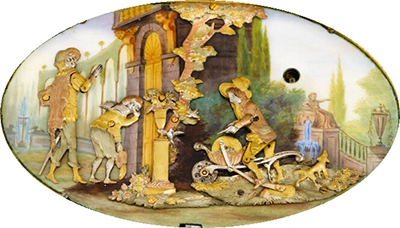Gold and enamel snuff box with music and automaton, Guidon, Rémond, Gide, Geneva, 1792 – 1801, N° 10 Oval, the lid painted en plein with Telemachus arriving with Mentor on Calypso's isle, ...
... within a chased and enamelled border, the sides and base decorated in taille d'épargne enamels with a diaper design within similar borders, the sides divided by urns on a ground pierced to help the music be heard, the lid opening to show the
complicated coloured gold automaton by which figures in renaissance dress conduct music and peep at an itinerant knife grinder, gilt sur plateau movement, apparently unmarked, scratched number '10' in two places, the enamel ground painted as a romantic Italianate garden with trees, arcades and statues, the base opening for the key compartment, maker's mark, with original key decorated with matching diaper pattern
Between 1792 and 1801 Jean-George Rémond (1752-1830), the goldsmith from Hanau, and his compatriots Jean-Noé Lamy and Laurent Guisseling, were in partnership in Geneva with the locally-trained stalwarts David Gide and Joseph Guidon. The relationship was not only a working one since the 1797 census records that all five families were also living on different floors of the maison Guidon in the rue du Cendrier. Professionally, the partnership was to prove most successful as attested by the number of beautiful snuff boxes and cases for automata struck with this mark, in the style that was to become known as ‘Geneva enamelling’ but which in fact contains many elements derived from Hanau. By 1801, however, it was decided not to renew the partnership and the two elements separated again with Rémond, Lamy and Guisseling moving to new premises. According to Frédéric Leschot, for whom the firm had worked, the split was not amicable. Indeed he blamed the break-up for his delay in sending a promised ‘temple’ to his client Duval in London (BGE, papiers Leschot, Ms. Suppl. 964, pp. 165/6, letter dated 5 February 1801). What a pity, there is no description of the musical mechanism. ©Sotheby's 2020
|



